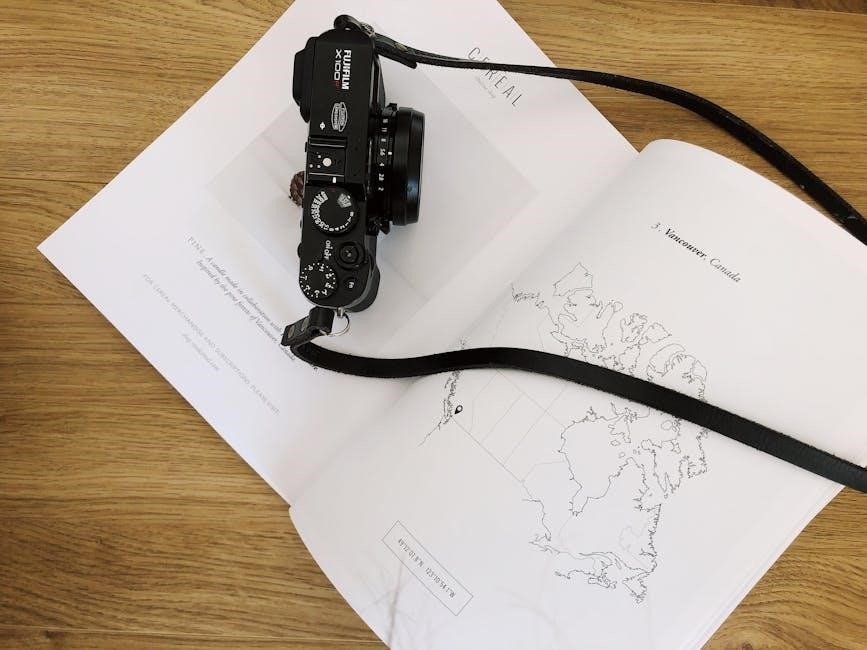Act 1 of Romeo and Juliet introduces the feud between Montagues and Capulets‚ setting the stage for tragedy. The prologue highlights Verona’s conflict‚ while key characters emerge‚ foreshadowing doomed love.
1.1. The Prologue: Setting the Stage
The prologue‚ delivered by the Chorus‚ sets the stage for the tragic events of Romeo and Juliet. It introduces Verona as the backdrop‚ highlighting the ancient feud between the Montagues and Capulets. The Chorus explains that two “star-cross’d lovers” from these families will meet a doomed fate‚ resolving the conflict but at a great cost. This opening sonnet establishes the tone of inevitability and sorrow‚ preparing the audience for the unfolding drama. The Chorus’s role is crucial‚ as it guides the audience’s understanding of the play’s themes and outcomes‚ framing the story as a tale of fate and tragic love.

1.2. Establishing the Feud Between Montagues and Capulets
The feud between the Montagues and Capulets is a central element of Romeo and Juliet‚ driving the play’s conflict. Act 1 introduces this rivalry through a public brawl in Verona‚ where servants from both families clash. The tension escalates with the arrival of Tybalt‚ a fiery Capulet‚ and Benvolio‚ a peace-seeking Montague. Their confrontation highlights the deep-seated hatred between the families. The Prince of Verona intervenes‚ warning both families to end their violent disputes. This opening scene establishes the feud as a longstanding‚ destructive force that permeates the city and shapes the characters’ actions. The rivalry sets the stage for the tragic events that will unfold‚ as the families’ animosity indirectly fuels the lovers’ doomed fate.

Key Scenes in Act 1
Act 1 highlights the feud‚ Romeo’s heartache over Rosaline‚ Juliet’s arranged marriage‚ and the Capulets’ party‚ where Romeo decides to attend‚ sparking the tragic love story.

2;1. Act 1‚ Scene 1: The Quarrel in Verona
Act 1‚ Scene 1 opens with a quarrel between servants of the Montagues and Capulets‚ showcasing the deep-seated animosity between the two families. The scene introduces Sampson and Gregory‚ Capulet servants‚ who provoke the Montagues. Abram and Benvolio‚ a Montague‚ arrive‚ leading to a tense confrontation. Lord Capulet and Lord Montague appear‚ escalating the conflict‚ while their wives try to calm them. The Prince of Verona intervenes‚ warning both families to end their feud. This scene sets the tone for the play‚ highlighting the ongoing rivalry and its impact on Verona. It establishes the volatile atmosphere that ultimately leads to the tragic events unfolding in the story.
2.2. Act 1‚ Scene 2: Romeo’s Unrequited Love for Rosaline
In Act 1‚ Scene 2‚ Romeo expresses his deep sorrow over his unrequited love for Rosaline‚ a woman who has sworn to remain chaste. He confides in his friend Benvolio‚ who advises him to forget Rosaline by pursuing other romantic interests. Romeo‚ however‚ remains steadfast in his devotion‚ showcasing his intense emotional state and romantic nature. Meanwhile‚ Lord Capulet discusses his plans for Juliet’s marriage to Paris‚ unaware of the impending conflict. This scene highlights Romeo’s vulnerability and sets the stage for his eventual meeting with Juliet‚ shifting his focus from Rosaline to a new‚ fateful love.
2.3. Act 1‚ Scene 3: Lord Capulet’s Plans for Juliet’s Marriage
In Act 1‚ Scene 3‚ Lord Capulet discusses his plans for Juliet’s marriage with Paris‚ a wealthy and esteemed suitor. He believes the union will strengthen the Capulet family’s standing and secure Juliet’s future. Lady Capulet supports the idea‚ emphasizing the benefits of the match. Juliet‚ however‚ is not consulted‚ reflecting the societal norms where women’s voices were often overlooked. This scene establishes the societal expectations surrounding marriage and sets the foundation for Juliet’s eventual defiance. The Capulets’ decision highlights the familial pressures that will later clash with Juliet’s own desires‚ particularly her love for Romeo‚ leading to the tragic events of the play.
2.4. Act 1‚ Scene 4: The Capulets’ Party and Romeo’s Decision
In Act 1‚ Scene 4‚ Romeo attends the Capulets’ party‚ disguising himself to avoid detection. Despite the danger‚ he is determined to see Rosaline‚ the object of his unrequited love. At the party‚ Romeo is captivated by Juliet’s beauty and grace‚ leading to an instant connection. Their meeting sparks a chain of events that drives the plot forward. Romeo’s decision to attend the party‚ despite the feud‚ showcases his impulsive nature and sets the stage for the tragic love story. This scene highlights the societal tensions and personal desires that collide in Verona‚ propelling the narrative toward its inevitable conflict.
Act 1 introduces Romeo as a passionate yet melancholic lover‚ Juliet as an emerging heroine‚ and supporting characters like Benvolio and Tybalt‚ shaping the play’s emotional landscape.
3.1. Romeo Montague: A Lover’s Dilemma
Romeo Montague is introduced as a young‚ passionate lover‚ consumed by his unrequited love for Rosaline. His emotional state is marked by melancholy and introspection‚ showcasing his sensitivity. Romeo’s friend Benvolio advises him to forget Rosaline‚ highlighting Romeo’s deep emotional conflict. Later‚ Romeo’s instant infatuation with Juliet at the Capulets’ party underscores his impulsive nature. This duality of sorrow and passion defines Romeo’s character‚ setting the stage for his tragic journey. His words and actions reveal a romantic idealist‚ driven by intense emotions‚ which ultimately lead him to make life-altering decisions.
3.2. Juliet Capulet: The Emergence of a Heroine
Juliet Capulet is introduced as a young‚ naive‚ and obedient daughter‚ shaped by her family’s expectations. Her mother and the Nurse discuss her potential marriage to Paris‚ highlighting her innocence. Juliet’s language is simple‚ reflecting her youth and sheltered upbringing. However‚ her initial hesitation about marriage suggests a glimmer of independence. Upon meeting Romeo‚ Juliet’s demeanor shifts‚ showcasing her capacity for profound emotion and love. This encounter marks the beginning of her transformation from a dutiful daughter to a determined heroine. Juliet’s character evolves‚ revealing her inner strength and willingness to challenge societal norms for love‚ setting the stage for her tragic yet heroic journey.
3.3. Supporting Characters: Benvolio‚ Tybalt‚ and Lord Capulet
Benvolio‚ a Montague‚ emerges as a voice of reason‚ attempting to mediate the feud and calm tensions. His level-headed nature contrasts with Tybalt’s fiery temperament. Tybalt‚ a Capulet‚ is aggressive and eager to provoke the Montagues‚ showcasing his deep-seated hatred. Lord Capulet‚ Juliet’s father‚ is authoritative and focused on securing his family’s legacy through strategic marriages. He appears firm yet concerned for Juliet’s future. These supporting characters highlight the conflict’s complexity and drive the plot forward‚ influencing the lovers’ fate. Their interactions reveal the societal pressures and familial expectations that shape the characters’ decisions in Verona’s divided world.
Themes and Motifs in Act 1
Act 1 explores themes of love and hate‚ with the feud dominating Verona. Fate is introduced through the chorus‚ hinting at the inevitable tragic outcome.
4.1. Love vs. Hate: The Central Conflict
The central conflict of Act 1 is the clash between love and hate. Love is portrayed through Romeo’s unrequited passion for Rosaline and his later infatuation with Juliet. Conversely‚ hate dominates the feud between Montagues and Capulets‚ with Tybalt embodying this animosity. The tension between these emotions is evident in the brawl in Verona‚ where hate prevails‚ and in Romeo’s romantic musings‚ where love takes center stage. This duality sets the tone for the tragedy‚ as love struggles to survive amidst a backdrop of hatred and violence‚ foreshadowing the devastating consequences of this enduring conflict.
4.2. Fate and Fortune: The Chorus’s Perspective
The Chorus in Act 1 emphasizes fate and fortune as guiding forces in the lives of Romeo and Juliet. The prologue introduces the concept of “star-cross’d lovers‚” suggesting their destinies are intertwined and predetermined. The Chorus’s commentary highlights the inevitability of events‚ framing the characters’ actions as part of a larger cosmic plan. This perspective underscores the idea that fate‚ rather than personal choice‚ drives the narrative. The Chorus’s words create a sense of inevitability‚ preparing the audience for the tragic outcome. By focusing on fate‚ Shakespeare underscores the universal and timeless nature of the conflict‚ leaving little room for escape from the doomed path the lovers are destined to follow.

Key Quotes and Their Significance
Key quotes in Act 1 of Romeo and Juliet reveal the play’s central themes and character motivations. The Chorus famously declares‚ “From forth the fatal loins of these two foes / A pair of star-cross’d lovers take their life” (Prologue). This sets the tone for inevitable tragedy and highlights fate’s role. Romeo’s lament‚ “Alas‚ that love so gentle in his view should be so tyrannous and rough‚” (1.1) underscores his unrequited love for Rosaline. Lord Capulet’s demand‚ “My child is yet a stranger in the world” (1.2)‚ reflects his controlling nature. These quotes establish the conflict‚ fate‚ and emotional depth that drive the narrative forward‚ foreshadowing the doomed love story at the play’s core.


